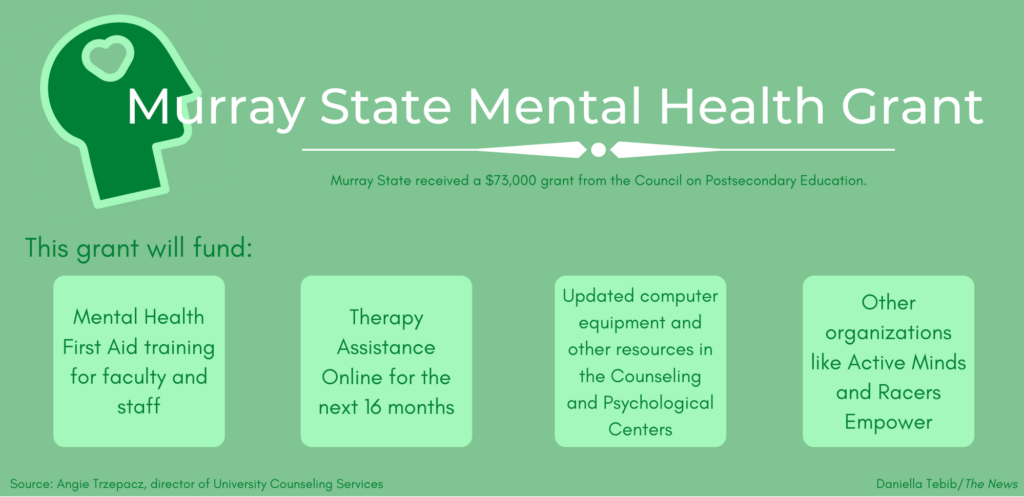Levi Brandenburg
Contributing Writer
lbrandenburg1@murraystate.edu
Murray State received $70,000 of funding from the Governor’s Emergency Education Relief fund (GEER) that will go towards mental health services on campus.
Angie Trzepacz, director of counseling services, said the funds will be distributed to all the Kentucky public universities by the Council on Postsecondary Education (CPE).
Murray State will allocate the funding for three areas. First, the state paid for mental health first aid training for faculty and staff who are interested. Second, the funding will contribute to accessing Therapy Assistance Online (TAO) for all students, faculty and staff for the next 16 months. The remaining funding will go to mental health services.
“The grant funding will be distributed among several areas, including the Counseling Center, the Psychological Center, Active Minds, Racers Empower and our first-year transitions courses,” Trzepacz said. “Some of the funds will be spent to update computer equipment in the Counseling Center and Psychological Center and to provide professional training for counselors.”
In addition, Trzepacz said other funds will be used to help promote mental health services on campus and increase student awareness of resources provided to them, which includes counseling and TAO resources. TAO provides online educational and self-help resources and interactive tools, which will allow for more behavioral health treatment and education on helpful skills.
Other funding has already been spent to purchase additional Wi-Fi hotspots for students who need access to mental health resources, Trzepacz said.
Trzepacz said the Counseling Center is coordinating with trained educators from Mental Health First Aid USA who will provide the 8 hour course offered to faculty and staff. There are currently 180 faculty and staff signed up for the Mental Health First Aid training, and Trzepacz said they are waiting to hear from the CPE on whether additional spots are available.
“The Mental Health First Aid training will ensure that more of [students’] contacts on campus will be able to recognize when they are struggling and will know how to help them and how to refer them to the resources available on campus,” Trzepacz said.
The training will be held at various times over the next 16 months, Trzepacz said. For now, the course is only available to people over Zoom, but eventually it will be held in person with the trainers traveling to Murray during the training sessions. Future sessions have not yet been confirmed, but all trainings must be completed by June 30, 2022.
Trezpacz said TAO will be helpful as both an instrument to enhance counseling services for students who want to access counseling, as well as a self-help resource for students who are not yet comfortable with counseling or may not feel their issues reach the level of needing individual counseling.
“We would encourage any faculty and staff who are interested in the course to contact me,” Trzepacz said. “Our students would benefit from having as many people on campus as possible who are able to recognize signs of mental health concerns and appropriately refer students to the resources available on campus.”
Updated computer equipment and training for counselors in the Counseling and Psychological Centers will help them be more effective and knowledgeable when interacting with students, Trzepacz said.
“We hope that the resources available to students in transitions classes will help students have a smoother transition into college life and have increased awareness of the importance of mental health and wellness and some tools to help them achieve that.”
Along with anxiety and depression, Trzepacz said students are struggling with loneliness and social isolation due to restrictions from the past year. She said students are also struggling with online learning because they miss both the classroom and interactions with other students and professors, and virtual classes do not provide the same structure and routine they usually depend on to help organize their time.
According to the Kentucky Department of Education, the GEER fund was authorized under the Coronavirus Aid, Relief and Economic Security (CARES) Act to help combat effects of the pandemic.
Gov. Andy Beshear allotted $30 million to be administered by the Kentucky Department of Education and to local education agencies. The intended uses of the funds are to increase higher quality remote learning experiences and to expand remote food services to students.
Anyone interested in getting on the waiting list for the Mental Health First Aid training can contact Angie Trzepacz at atrzepacz@murraystate.edu to be put on a waiting list.
The Counseling Center is available at no charge to Murray State students, staff and faculty, and is currently offering remote services. They can be reached at msu.counselingcenter@murraystate.edu.




























































































